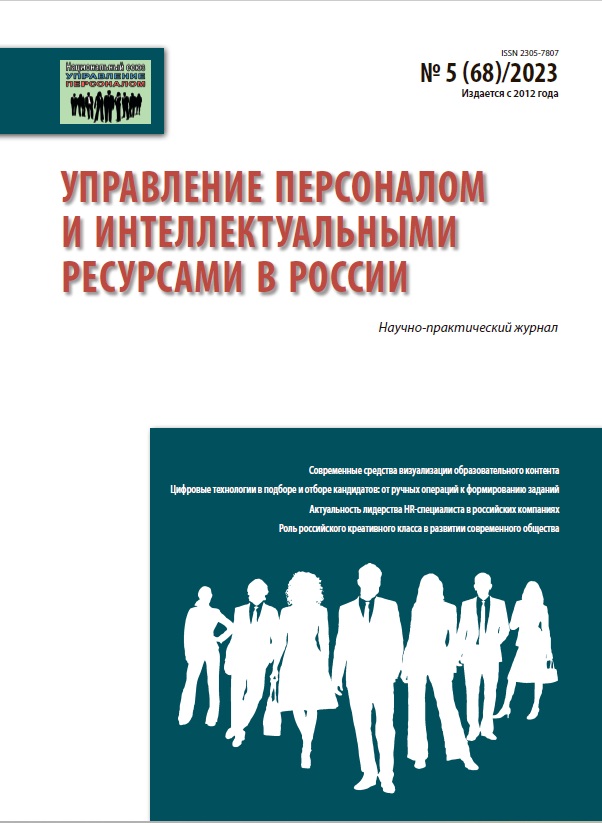Russian Federation
The article presents an analysis of the approaches of domestic and foreign authors to the problems of leadership in the organization and their relation to the request for the leadership of an HR specialist. Leadership is considered as a mandatory element of management that determines both the management style in the company as a whole and the specifics of the work of an HR specialist in particular. The study reveals the specificity of the influence of an HR specialist on the corporate culture and staff loyalty in connection with the request for a leadership from the management. It has been established that the most popular leadership style of an HR specialist is an advisory style, in which goals and methods to achieve them are discussed, but the final decision on both goals and methods is made by the head. The authors analyzed the relationship between the leadership of an HR specialist and the relevance of the tools used in the activities of HR services. Based on the results obtained, recommendations were formed to identify the need for HR leadership and to build efficient interaction between managers and HR specialists.
leadership, management style, HR function, corporate culture, staff loyalty
1. Avdeev P.S. Obzor teorij harizmaticheskogo liderstva v menedzhmente i politike // Psihologiya, sociologiya i pedagogika. [Review of theories of charismatic leadership in management and politics//Psychology, sociology and pedagogy.] -2015. - №1 [Electronic Resource]. - URL: https://psychology.snauka.ru/2015/01/4047 (Accessed on: 24.02.2023). (in Russian) EDN: https://elibrary.ru/TMONZB
2. Adizes I. Stili menedzhmenta - effektivnye i neeffektivnye // Ickhak Kalderon Adizes ; Per. s angl. - M.: Al'pina Biznes Buks [Management styles - effective and ineffective//Yitzhak Calderon Adizes; Per. from English - M.: Alpina Business Books,] -2009. - 199 s. (in Russian)
3. Bezkruglyj D.L. Liderstvo i upravlenie komandoj // Uchebnoe posobie [Leadership and Team Management//Textbook,] GU - HSE, 2007. (in Russian)
4. Valishin E.N. Stilevye osobennosti prinyatiya reshenij rukovoditelem v processe upravleniya personalom //Upravlenie ekonomicheskimi sistemami: elektronnnyj nauchnyj zhurnal [Style features of decision-making by a manager in the process of personnel management // Management of economic systems: electronic scientific journal.] 2016. // [Electronic resource] - URL: https://cyberleninka.ru/article/n/stilevye-osobennosti-prinyatiya-resheniy-rukovoditelem-v-protsesse-upravleniya-personalom/viewer (date of access: 04/25/2023). (in Russian)
5. Komarov V.V. Organizacionnoe liderstvo: podhody k opredeleniyu i klassifikacii stilej liderstva // Liderstvo i menedzhment [Organizational Leadership: Approaches to the Definition and Classification of Leadership Styles // Leadership and Management.] - 2022. - Volume 9. - No. 2. - P. 439-460. DOI:https://doi.org/10.18334/lim.9.2.114367. (in Russian) EDN: https://elibrary.ru/UPOWVL
6. Kubrak K. I., Panin D. I. Razvitie liderstva v rossijskih kompaniyah // Molodoj uchenyj. [Development of leadership in Russian companies // Young scientist.] - 2019. - No. 22 (260). - S. 550-553. [Electronic resource] - URL: https://moluch.ru/archive/260/59776/ (date of access: 04/25/2023). (in Russian) EDN: https://elibrary.ru/YQHYVK
7. Kuznetsov, D. A., Kulkova I. A. Issledovanie vospriyatiya liderstva v organizacii // Modeli, sistemy, seti v ekonomike, tekhnike, prirode i obshchestve. [Study of the perception of leadership in an organization // Models, systems, networks in economics, technology, nature and society.] - 2017. - No. 2 (22). - C. 58-68. (in Russian) EDN: https://elibrary.ru/ZBQAVB
8. Makrushina N.A., Ostrikova A.A. Vliyanie stadii zhiznennogo cikla, stilej liderstva i organizacionnoj kul'tury organizacii na vybor HR-instrumentov. // Voprosy studencheskoj nauki [The influence of the life cycle stage, leadership styles and organizational culture of the organization on the choice of HR tools. // Issues of student science.] - 2021. - No. 5 (57). - P. 79-83 viewer (date of access: 04/25/2023). (in Russian)
9. Reznikova O.S., Zavatskaya V.V. Upravlenie personalom za schet «liderskogo podhoda» // Gumanitarnye nauchnye issledovaniya. [Personnel management through the "leadership approach" // Humanitarian scientific research.] - 2017. - No. 3. [Electronic resource]. - URL: https://human.snauka.ru/2017/03/22236 (date of access: 04/17/2023). (in Russian) EDN: https://elibrary.ru/YJUFGP
10. Sleptsova E.V., Ovezova K. Problemy liderstva v organizacii i ih vliyanie na upravlenie povedeniem personala // Journal of Economy and Business [Problems of leadership in an organization and their impact on personnel behavior management // Journal of Economy and Business,] No. 9, P. 178-181. [Electronic resource]. - URL: /Users/%D0%B4%D0%BD%D1%81/Downloads/problemy-liderstva-v-organizatsii-i-ih-vliyanie-na-upravlenie-povedeniem-personala%20(1).pdf (accessed: 04/17/2023). (in Russian)
11. Suvalova T.V. Trebovaniya k HR-specialistu 2022 // Upravlenie personalom i intellektual'nymi resursami v Rossii [Requirements for an HR specialist 2022 // Personnel and intellectual resources management in Russia] - 2022 - Volume 11 - No. 1 - P. 59 - 63. (in Russian) DOI: https://doi.org/10.12737/2305-7807-2022-11-1-59-63; EDN: https://elibrary.ru/ZBEUNG
12. Tverdola N.M. Liderstvo i instrumenty razvitiya liderov v usloviyah VUCA // Upravlenie personalom i intellektual'nymi resursami v Rossii [Leadership and Leadership Development Tools under VUCA // Personnel and Intellectual Resource Management in Russia] - 2018 - Volume 7, - No. 6, - P. 14-18. (in Russian) DOI: https://doi.org/10.12737/article_5c17622c419df6.96602140; EDN: https://elibrary.ru/YWHMOD
13. Hersey P., Blanchard K.H. Management of Organizational Behavior. // Englewood Cliffs - 1977.
14. Lewin Kurt, Lippitt Ronald, White Ralph Patterns of aggressive behavior in experimentally created social climates // Patterns of aggressive behavior in experimentally created social climates. - 1939. - S. 271-301.






